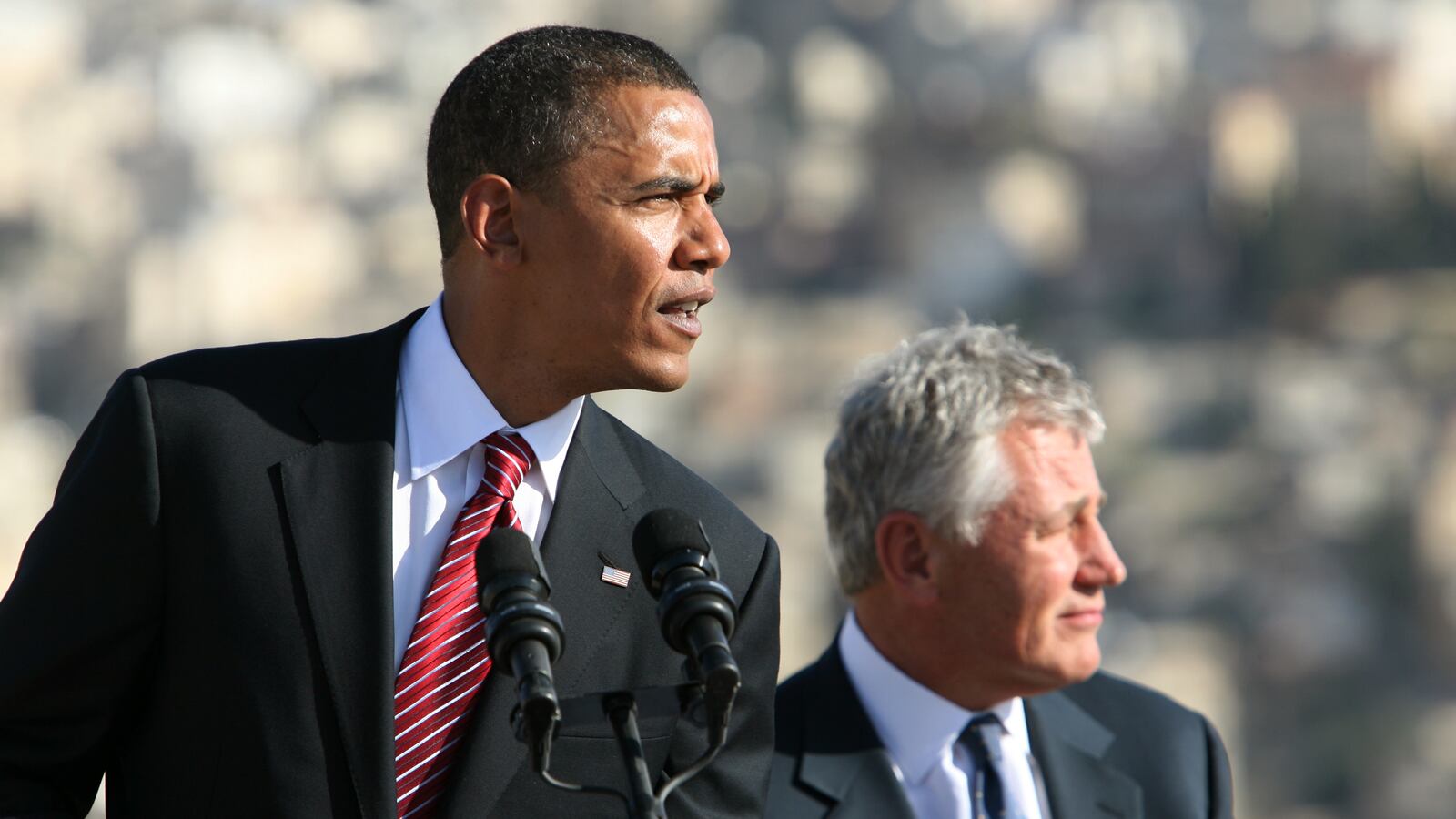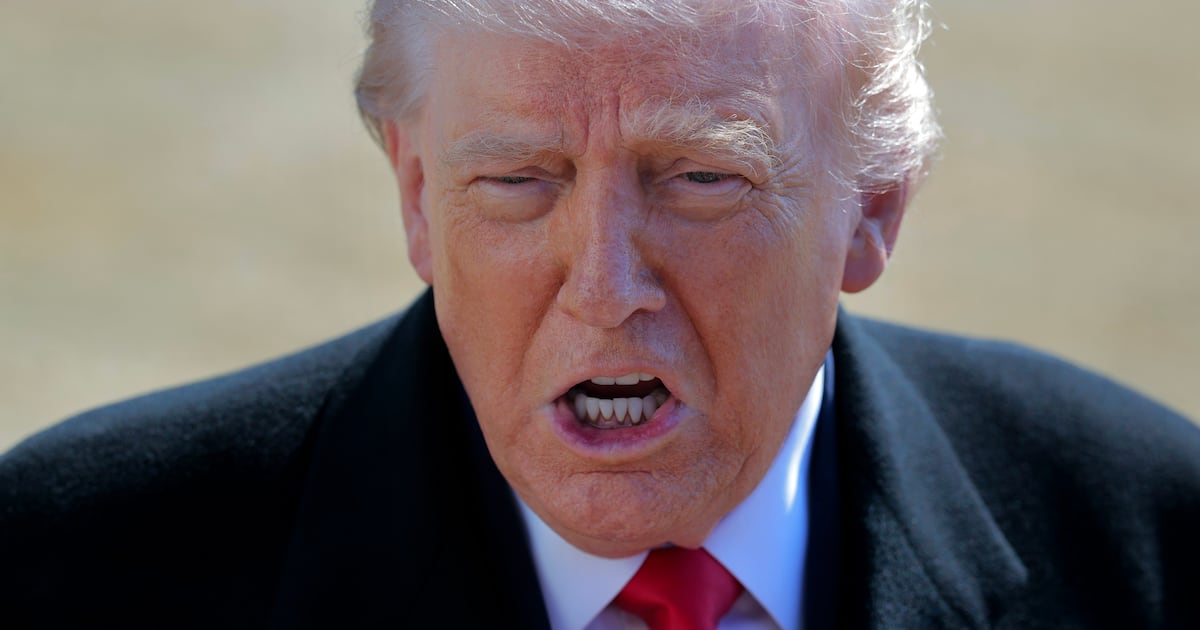When it comes to winning elections, Team Obama does it better than anyone. When it comes to winning nomination fights, not so much.Act One: Obama wins reelection, thus earning the presumptive right to name to high office pretty much whomever he wants.

Act Two: The media report that Susan Rice is his likely choice for Secretary of State, but Obama waits while the Republican flash mob on Benghazi gains strength. Then disaffected Africa wonks begin to gripe. Some off-message liberals chime in. And before you know it, our cool, it’s-just-business president has abandoned the woman everyone thought he really believed in.Act Three: Late last week, the administration leaks its new team: John Kerry for State, Chuck Hagel for Secretary of Defense. The early stories don’t even mention criticism of Hagel’s views on Israel or Iran. In the Senate, conservative Republicans and Jewish Democrats both responded with praise.
Act Four: The “pro-Israel” right begins to object. AIPAC is said to dislike the choice. Former AIPAC spokesman Josh Block calls Hagel “well outside the mainstream Democratic and Republican consensus” on Iran. (Block neglects to note that Hagel was also outside that consensus on Iraq, and prophetically so). In the Weekly Standard, an unnamed Senate aide bravely calls Hagel “an anti-Semite.Act Five: The Obama administration, having just watched a potential nomination die because it allowed right-wing opposition to swell, watches right-wing opposition swell and…does nothing. American Jewish “leaders” (in quotes because the vast majority of American Jews have no idea who said “leaders” are) attend the White House Chanukah party and then boast on background about how they spent it lobbying against Hagel. But the White House declines to defend Hagel’s Middle East record, either publicly, or best as I can tell, privately. Five separate people, each plugged into beltway Jewish Democratic politics, each told me that as far as they knew, the White House has done nothing to marshal a response to the Hagel attacks. “It’s a very closed circle,” notes one. “They don’t reach out.” A second is blunter. “He’s out there his own. It’s ugly.”
Meanwhile, the charges of anti-Semitism mount. Emboldened by the lack of a strong White House response, Jewish “leaders” begin publicly denouncing Hagel. Jewish Democrats, who just days earlier had praised him, now refuse to say whether he’ll have their support. Women’s groups begin objecting to the white maleness of the administration’s new foreign policy team. AIPAC lobbyists not previously known for their passion for gender diversity go around Capitol Hill gushing about the prospect of Michelle Flournoy becoming the first female secretary of defense. Meanwhile, the work of defending Hagel falls, basically, to Hagel, whose friends and aides—with some help from J Street—eventually rustle up a positive news story or two after days of being pummeled.
It’s political malpractice. If White House operatives really believed that because Hagel is a Republican former senator and because the GOP already got its scalp, hawks would look the other way while the administration nominated a man likely to oppose U.S. military action against Iran, those White House operatives should seek a different line of work. If the administration was just floating Hagel’s name to see what the response would be, secure in the knowledge that they could ditch him if the beltway gods frowned, that’s even worse. Throw one high-profile foreign policy nominee to the wolves and you look ruthlessly pragmatic. Throw two in the space of a few weeks and you look like an administration that can be rolled.
But the Hagel fight is about more than just the Obama administration’s reputation for political acumen. It will shape the climate for foreign policy nominees for years to come. Prior to this week, the conventional wisdom was that while AIPAC might be able to torpedo a Mideast envoy or assistant secretary of state for near eastern affairs, secretary of state and defense were above their pay grade. And if Obama actually nominated Hagel, that conventional wisdom would almost certainly be confirmed. After all, well-regarded Jewish senators like Dianne Feinstein and Carl Levin have already praised Hagel. Peter Joseph, chair of the centrist Jewish group Israel Policy Forum, calls the anti-Semitism charge “ridiculous.” When I asked the conservative, Jewish New York Times columnist David Brooks, he dismissed it as “untrue.”
Outside the far right, a faction whose foreign policy agenda was repudiated by both American Jews and Americans as a whole last month, few in the American Jewish establishment want to challenge a recently-elected president willing to fight for his nominee. Even the Anti-Defamation League’s Abe Foxman, who claimed that Hagel’s statements “border on anti-Semitism,” still left open the possibility that he could support him. AIPAC has still not commented publicly on Hagel’s nomination and I suspect that if the nomination happens, the organization—knowing that Hagel will be confirmed—may back off. When you’re as deeply involved in the U.S.-Israel military relationship as AIPAC, you need a relationship with the secretary of defense.
By leaking Hagel’s name but not defending him, the White House has, in other words, encouraged major “pro-Israel” groups to pick a fight they might otherwise have ducked. And if Obama backs down, it will leave the perception that those groups have more power over top foreign policy appointments than they actually do. That perception will create a new reality since any future administration considering a high-level foreign policy appointee who strays from the AIPAC line will remember the Hagel fiasco. And even more importantly, anyone who fancies themselves a future high-level foreign policy appointee will take even greater care to avoid independent thinking about the Middle East.
We’ve seen this before. From the 2009 settlement freeze fight to the 2011 call for a Palestinian state along the 1967 lines plus swaps, the Obama administration has a history of picking fights with the “pro-Israel” establishment and then backing down, which is worse than never picking the fight at all. When it comes to Israel policy, diverging from Washington orthodoxy requires genuine political conviction. In selecting Chuck Hagel, the Obama administration has found someone who has it. Whether the same can be said of the President himself remains to be seen.






